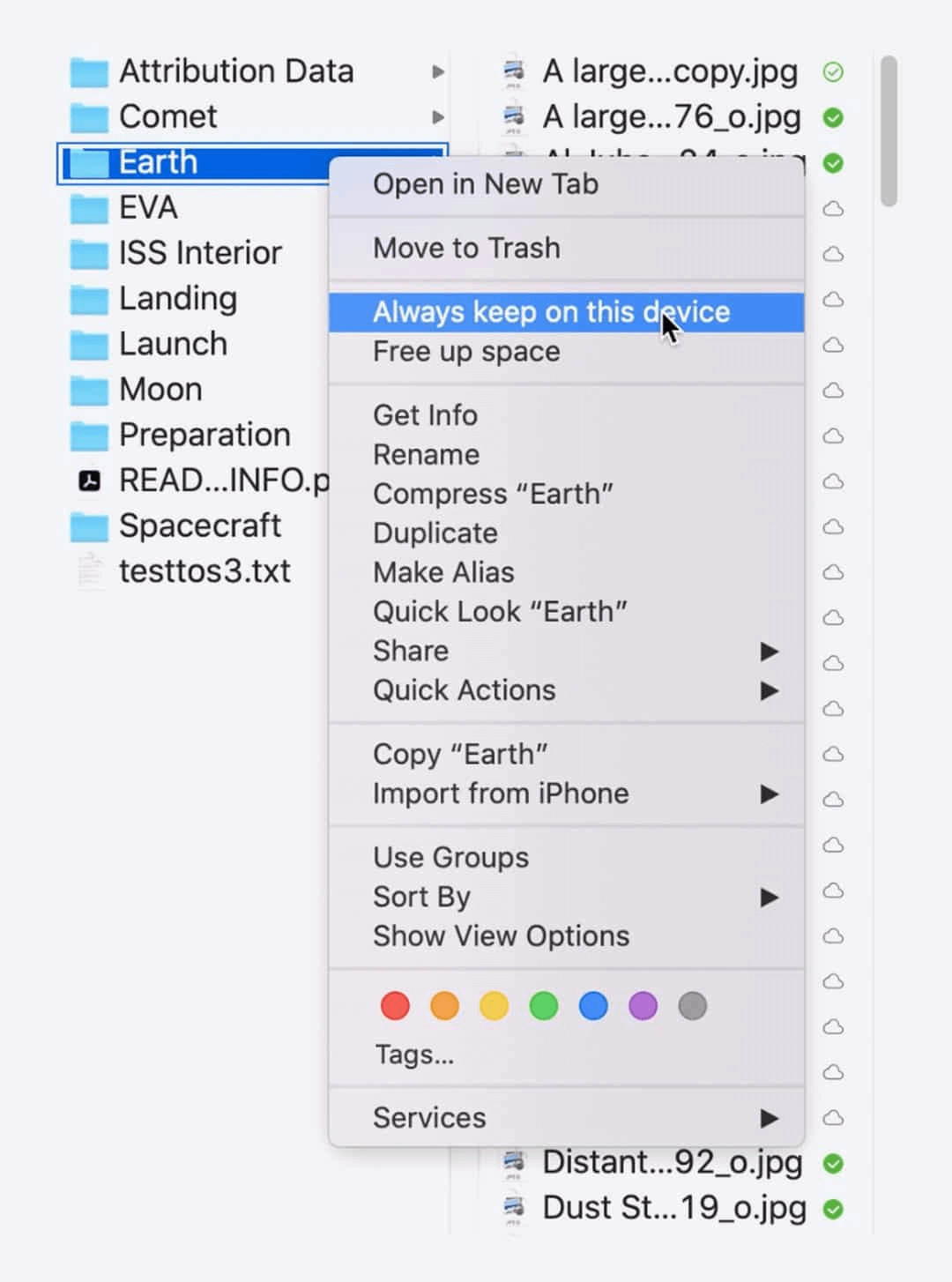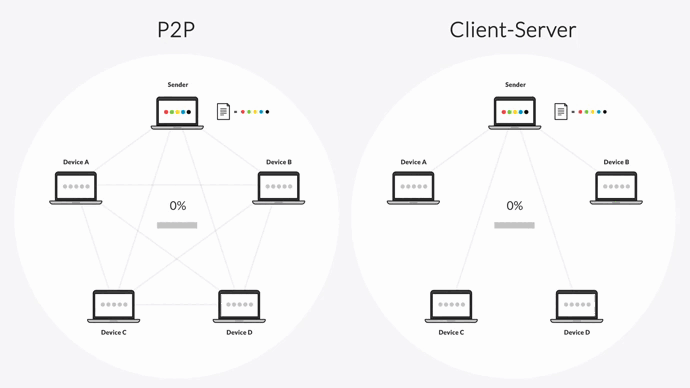Resilio Platform provides an extremely efficient and reliable Wasabi cloud storage gateway. The file gateway enables businesses to cache and access files stored in the Wasabi cloud (or any S3-compatible cloud) from any remote office or data center. The solution is software-only and installed on Windows, Linux, and some NAS systems (including OSNexus, TrueNAS, Synology, QNAP, and others).
Quite simply, Resilio’s file gateway for Wasabi transforms your existing file servers and NAS systems into fast, efficient, and flexible storage gateways to the cloud.
Through the file gateway, Resilio makes it easy to remotely browse and selectively sync files stored in Wasabi with your on-premise file servers and your end-users. Files stored in Wasabi look just like they do on Windows and Linux. Users access the files through file servers as they normally would — via SMB (Server Message Block) or NFS (Network File System).
The synchronization process can be scheduled or on-demand. Files can be partially or fully downloaded and the synchronization process is fast and efficient. Only the files you actively need are stored on-prem, minimizing cloud egress traffic. You can combine low-cost, on-premises storage (DAS, SAN, NAS) with cloud object storage in one unified interface. Remote users can easily access and synchronize data with the cloud.
Another benefit is that you can store infrequently accessed files in long-term cloud storage — and have more active (or “hot”) files stored on-prem.
Unlike other storage gateway solutions, Resilio offers transparent selective sync: You can selectively download and sync files on-demand or automatically between your on-prem servers and the cloud.
Low-cost, on-premise storage space can be logically combined with long-term cloud object storage — all through a single, unified interface.

Transparent selective sync, combined with Resilio’s P2P (peer-to-peer) architecture and WAN acceleration technology, enable businesses to move and sync files at full speed over any network, regardless of latency and network quality.
With Resilio Connect, you can synchronize and access files across on-prem servers and cloud storage services (as well as other cloud storage solutions, such as AWS S3, Backblaze, Azure Blobs, and more) for multiple use cases, such as remote work, app data storage, and disaster recovery scenarios.
Resilio Platform is the best Wasabi file gateway due to:
- Cost-effective, efficient file caching and access
- High-performance, WAN-optimized synchronization
- Simplified, centralized management over your replication environment
- Flexible, cloud- and storage vendor-agnostic deployment. (You can use your cloud provider of choice, type of storage, and Windows, Linux, or your NAS system.)
- End-to-end data integrity and security are built in
To learn more about using Resilio Platform as a Wasabi file storage gateway, schedule a demo.
Cost-Effective, Efficient File Cache & Access
Resilio Connect’s file interface for Wasabi object storage (or any S3 compatible cloud, such as AWS S3, Backblaze, Azure Blobs, etc.) provides organizations with an easy and efficient way to access files that are stored remotely on cloud object storage.
Users can store files on low-cost Linux, Windows, or NAS devices running a Resilio Agent and on low-cost cloud storage services, freeing up space on their on-prem devices and reducing operational costs.
Files stored in Wasabi cloud storage are cached locally by Resilio at remote sites where they can be quickly and easily accessed by end-users on the server closest to them. End-users simply mount a file share in order to make their file system accessible as they normally would, and both end-users and admins can browse the remote files and select which they want to download and sync. All the while, on-prem file sharing mechanisms continue to operate as usual.
And because Resilio is a vendor-agnostic solution that can be installed on your existing IT infrastructure — using tools your team already owns and understands (unlike proprietary cloud file systems that require new hardware resources) — deploying Resilio is incredibly cost-effective.
Resilio’s file gateway provides:
Flexible Sync Modes (Transparent Selective Sync)
You can browse, select, and download only what you need.
Using a feature known as Transparent Selective Synchronization (TSS), every server in your environment can act as an edge cache, storing content closer to end-users, so files can be selectively downloaded, stored, and synced.
With TSS, you can access your on-prem file servers over SMB, browse files stored in remote locations, and choose which files to download locally. Users have the ability to download, partially download, synchronize, and keep files on their device. Files are downloaded, cached in local storage, synchronized, and purged based on policies you control (learn more about TSS here).
Global Availability
Resilio Platform utilizes a peer-to-peer replication architecture. With P2P replication, every server in your environment can share files with any other server, and all servers can take part in replication simultaneously. Resilio can sync in any direction — one-to-one, bidirectional, one-to-many, many-to-one, and N-way sync — enabling you to replicate data centers and cloud regions as needed to meet availability goals.
Workflow Optimization
Resilio enables you to extend storage to any cloud, making files stored in the cloud available to other local users via SMB or NFS. You can optimize your workflows by keeping infrequently accessed files on longer term storage and keeping active files on local storage. This enhances productivity by providing you with flexibility and control over how you store files and enabling your employees to quickly access the files they use regularly.
High-Performance Cloud Sharing
Resilio Platform combines high-performance file synchronization with an easy-to-use file access interface, providing a globally-unified file sharing solution.
WAN Optimization
Efficiently and effectively transferring data over a wide area network can be a challenge, particularly with traditional replication solutions and replication protocols such as TCP/IP.
As packet RTT (Round Trip Time) increases, TCP/IP assumes this is due to network congestion and reduces transfer speed. It also performs poorly over unreliable networks. This can be especially troublesome when employees or users are utilizing consumer-grade networks, such as LTE/3G or ADSL, and you’ll need a sync solution that can address these issues.
Resilio Platform utilizes a proprietary WAN acceleration protocol known as Zero Gravity Transport™ (ZGT) to optimize file transfer over WANs and enable you to move files at full speed over any IP network — regardless of latency or network quality.
ZGT optimizes WAN transfer using:
- Bandwidth controls: ZGT efficiently utilizes any network based on bandwidth allocations you control. You can configure profiles for each server that govern how much bandwidth that server can use at a certain time of the day (or day of the week).
- Congestion control algorithm: While other transfer protocols transfer data at one consistent rate, ZGT’s congestion control algorithm periodically probes the RTT (Round Trip Time) in order to constantly calculate the ideal send rate and maintain a uniform packet distribution over time.
- Interval acknowledgments: While most transfer protocols acknowledge each received packet, ZGT increases transfer speed by only sending acknowledgements for groups of packets. And it decreases unnecessary retransmissions by retransmitting lost packets just once per RTT.
- Checksum restart: If replication is interrupted mid-transfer, Resilio can perform a checksum restart and resume the transfer where it left off, rather than starting over from the beginning.
While you can adjust how files are transferred over WANs, ZGT’s transfer policies come pre-configured — ensuring predictable, high performance over any WAN.
Resilio’s WAN optimization also supports edge deployment, enabling you to transfer and sync data to and from the edge of networks (such as in remote locations, at sea, etc.).
Fast, Omnidirectional Synchronization
Resilio Platform can quickly and efficiently synchronize millions of files across cloud storage regions and on-premises servers, utilizing:
- P2P (peer-to-peer) replication
- Real-time, omnidirectional synchronization
Most other replication solutions use point-to-point replication architectures.
In these replication setups, data can only be replicated from one server to another sequentially, either through client-server replication (where data is first transferred to a hub server that then replicates the data to every other server one by one) or through follow-the-sun replication (where Server 1 replicates data to Server 2; then Server 2 replicates to Server 3; and so forth).
Point-to-point replication topologies can only replicate data to one server at a time. So if you’re replicating large files, large numbers of files, or replicating to a large number of endpoints, full synchronization across your entire environment will take a long time. This can create issues for remote work, disaster recovery, and web/app server sync deployments. For example:
- Employees won’t get timely access to the data they need. Or, if they try to access a file before full sync has completed, they’ll access an older, incomplete version of the file.
- App updates won’t get propagated to all servers and users in a timely manner. Users won’t be able to access parts of your app.
- Any single server in your replication environment can become a bottleneck for full synchronization. If one server is on a slow or downed network, the other servers will have to wait for replication to complete on that server before they receive their files/updates.
On the other hand, Resilio Platform uses a peer-to-peer replication topology.
With peer-to-peer replication, every server in your environment can send data to and receive data from every other server simultaneously. So all of your servers can work together to deliver faster synchronization (up to 20 Gbps).
Resilio synchronizes only changed portions of files. Using notification events from the host operating system and optimized checksum calculations (i.e., identification markers that are assigned to each file that change when a change is made to the file), Resilio immediately identifies file changes and syncs them in real-time.
Resilio also uses a process known as file chunking, where files that need to be replicated are broken down into multiple chunks that can transfer independently of each other. So in a scenario where you need to synchronize a file across five servers, that file can be broken down into five chunks. Server 1 can share the first chunk with Server 2. As soon as Server 2 receives the first chunk, it can share it with Server 3, even before it receives the other four chunks.
With the combination of real-time P2P replication and file chunking, Resilio Platform can synchronize any amount of data (tested at 400+ million files in a single job) 3-10x faster than traditional sync solutions. This enables you to ensure all on-premises and cloud servers always have the most up-to-date versions of files.

You can choose to include file permissions and other file system metadata in sync jobs. And file syncing utilizes push and pull caching for cloud storage and on-prem servers, enabling you to pull remote files on demand and automatically push updates across your organization in real-time.
Another benefit of P2P replication with Resilio is that you can sync files in any direction, including one-to-one sync, one-to-many sync, bidirectional sync, many-to-one sync, and N-way sync. This enables you to scale out omnidirectional and cross-region replication, so employees and customers can use any cloud location when accessing files and services.
Resiliency
Resilio Platform provides highly-resilient file replication and synchronization, so you can be sure every endpoint in your environment has the latest versions of files.
As stated earlier, point-to-point replication systems can create bottlenecks. But Resilio’s P2P replication system means that there is no single point of failure. Every server can take part in replication. So if one server goes down, the necessary files or services can be received from any other server in your environment.
Resilio can also dynamically route around network outages, and uses cryptographic data integrity validation to ensure files always arrive at their destination intact and uncorrupted.
Flexible, Vendor-Agnostic Deployment
Resilio is a flexible, vendor-agnostic cloud file storage gateway that enables secure file access and simplified data center management for all files across your on-prem and cloud storage servers.
Because Resilio builds on open file formats, open standards, and an open, multi-cloud architecture, users can mix and match cloud storage providers.
In addition to Wasabi, Resilio supports Amazon S3 AWS, Microsoft Azure, Google Cloud Platform, Wasabi, and Backblaze, and more. It also runs on VMware, Citrix, and other virtualization platforms and workspaces. And it works on popular operating systems, such as Microsoft Windows, Apple Mac, Linux, Android, and more.
With Resilio’s well-documented REST API, you can control all aspects of cloud file storage, automate syncs, and integrate with applications and matching frameworks.
Resilio can be deployed on the existing IT storage infrastructure (desktops, servers, storage, and networks) that your team already owns and operates.
Unlike proprietary cloud file systems like Azure, Resilio uses storage (DAS, NAS, SAN) that your team owns and is already familiar with. Administrators can use enterprise storage devices and available storage space, and blend storage capacity from any type of storage platform or array (SSDs, hard drives, other NAS devices, and storage systems).
Resilio is an incredibly efficient and cost-effective solution that enables you to minimize storage costs. There’s no need to buy or learn new hardware, and no need to migrate data — saving you time and money.
End-to-End Security
Resilio provides state-of-the-art security, reviewed by 3rd party security experts. Security features are built into Resilio, so you don’t need to use 3rd party security tools or VPNs (though these are optional). And it provides data immutability — i.e., copies of your files are stored in the public cloud, protecting you from ransomware and preventing data loss.
Resilio’s data protection security features include:
- End-to-end encryption: Files are encrypted at rest and in transit using AES 256.
- Cryptographic data integrity validation: Your files will always arrive at their destination intact.
- Mutually authenticated endpoints: Files are only delivered to endpoints that you approve, keeping your data safe from accidental leaks.
Simplified Control with Centralized Management
Resilio makes it easy to manage, monitor, control, and troubleshoot file replication and management.
You can use Resilio’s Management Console to centrally manage and monitor agents, job functions, and replication parameters — such as buffer size, disk I/O, bandwidth, and more. Administrators can create and control jobs and deploy instructions across private, public, and hybrid clouds. And you can set up notifications, collect logs, and monitor transfers through one unified dashboard.
Users can browse files in cloud object storage as if they’re on an on-premises server from a unified interface that operates much like Microsoft OneDrive. Everyone on your team gets the same view of files and folders, and you can control who can access files as well as which files and folders get replicated to which endpoints.
Use Resilio for Your Wasabi File Storage Gateway
Resilio Platform is a cloud file storage gateway that provides:
- Cost-effective, efficient file caching and access: Resilio Platform enables you to efficiently store, access, and synchronize files between on-prem servers and cloud storage, enabling you to free up space on on-prem devices and reduce costs. With Transparent Selective Sync, files can be downloaded, partially-downloaded, cached in local storage, synchronized, and purged based on policies you control.
- Easy-to-use file interface: Resilio Platform enables you to easily browse files stored on your cloud or on-premises servers from a unified interface that operates much like Microsoft OneDrive. You can also selectively download specific files so that they’re cached locally, as needed.
- Flexible, vendor-agnostic deployment: Resilio is an agent-based software that builds on open file formats, so you can deploy it on your existing infrastructure with familiar tools and use it with any cloud storage — saving you time and money.
- High performance replication: Resilio provides fast (20 Gbps) P2P replication and WAN optimization technology, so you can quickly and reliably synchronize data in any direction and over any network for cold or hot storage use cases.
- End-to-end security: Resilio provides state-of-the-art security features that keep your data safe from interception; this prevents you from being exposed to ransomware attacks, so you never lose files.
- Centralized management: Resilio replication and file management can be controlled from a single, unified interface, making it easy to manage and monitor your files and replication environment. Users can also view and browse files from a unified interface that operates much like Microsoft OneDrive.
Schedule a demo to learn more about using Resilio Platform as a Wasabi file storage gateway.





